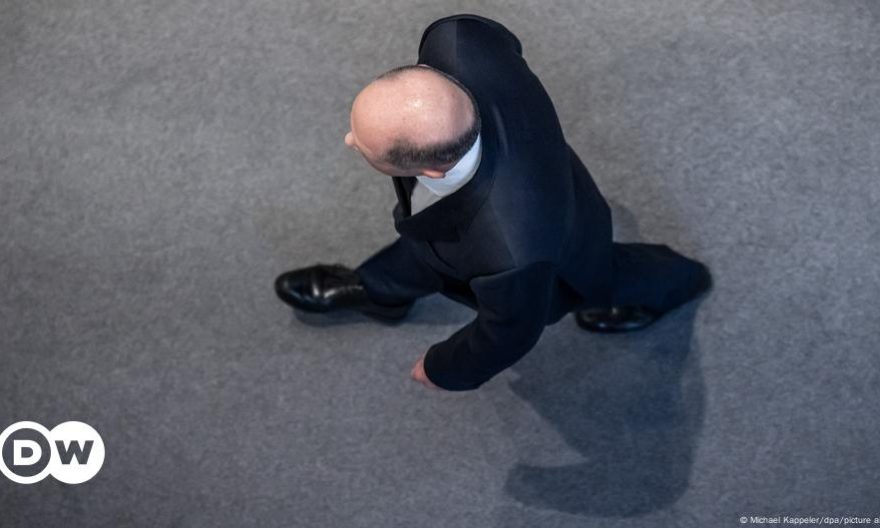
German Chancellor Olaf Scholz sought a vote of confidence in the lower house of Parliament, the Bundestag, on Monday December 16. He lost it,triggering an early general election.
Scholz’s three-way center-left government broke apart on November 6, paving the way for an early federal election on February 23, 2025.
Early elections have been extremely rare in Germany, but they are a vital democratic measure. They are regulated by the German constitution and require the approval of several constitutional bodies, not least of the head of state, the president.
According to the German Constitution, the decision to organize early federal elections must be made through the members of the Bundestag or the Chancellor. An early dissolution of Parliament can only occur in two ways.
In the first case, if a candidate for chancellor obtains an absolute parliamentary majority (at least 367 votes out of the 733 seats in the Bundestag), the German president can dissolve parliament. This has never happened in the history of the Federal Republic of Germany. Germany.
In this case, a chancellor can request a vote of confidence in the Bundestag to check whether he still has sufficient parliamentary support. If the chancellor fails to obtain a majority, he can officially ask the president to dissolve the Bundestag within 21 days.
Following the dissolution of parliament, an election must be held within 60 days. They are organized in the same way as normal general elections, with the federal returning officer and the Federal Interior Ministry responsible for their implementation.
To date, three early elections to the Bundestag have been held in the Federal Republic of Germany: in 1972, 1983 and 2005.
Willy Brandt, first chancellor of the center-left Social Democratic Party (SPD), in coalition with the neoliberal Free Democratic Party (FDP) since 1969. His “Ostpolitik” (Eastward policy) led to a vote of confidence in 1972.
Brandt had pushed ahead with his policy of rapprochement during the Cold War to ease relations with the socialist Eastern European bloc, a highly controversial move in West Germany. Major splits emerged within the government, causing several SPD and FDP Bundestag lawmakers to quit. The government’s majority was dramatically reduced, and Brandt’s support fell to parity with the opposition conservatives, the Christian Democratic Union (CDU) and the regional Bavarian Christian Socialist Union (CSU): each side had 248 representatives in the Bundestag.
This impasse had paralyzed the process and Brandt sought a solution. On June 24, 1972, he declared that “citizens” had the “right to see that the law is not paralyzed. ” The opposition will fundamentally refuse to cooperate constructively. “That is why I announce that we intend to organize new elections. “
Brandt asked for a vote of confidence in the Bundestag with the aim of wasting it, so that his chancellorship can be reconfirmed by the electorate in new elections. This resolution was heavily criticized, especially by constitutional experts who argued that intentionally wasting a vote of confidence is not in accordance with the spirit of the Constitution, the Basic Law.
Brandt stuck to his plan and called a vote of confidence on September 20, 1972 — and lost, as he had planned. That set the path for the Bundestag’s dissolution and a new election, which was held on November 19, 1972.
Brandt was re-elected chancellor and the SPD obtained 45. 8% of the vote, its most productive result to date. Voter turnout is the highest ever recorded in a Bundestag election: 91. 1%.
Helmut Kohl of the CDU, guilty of the early Bundestag elections in 1983. Kohl gained strength after a constructive vote of confidence in then-Chancellor Helmut Schmidt (SPD) in October 1982. Most MPs had withdrawn their confidence in Schmidt because of differences over his economic and security policy.
As Kohl’s CDU/CSU and FDP coalition came into force through a vote of confidence and not a general election, Kohl sought greater legitimacy through a general election. He called for a vote of confidence, which he also intentionally lost on December 17, 1982, leading to the dissolution of the Bundestag. Kohl then said: “I have paved the way for new elections to stabilize the government and obtain a transparent majority in the Bundestag. “
Some members of the Bundestag found this unacceptable and filed a complaint with the Federal Constitutional Court. After 41 days of hearings, judges in Karlsruhe approved Kohl’s path to new elections through a planned vote of no confidence. trust is only allowed in the event of a “real” crisis.
The next election, held on 6 March 1983, showed Kohl as chancellor and his government able to continue with a transparent majority.
Gerhard Schröder, of the SPD, presented the third early elections in Germany in 2005. At the time he was chancellor and headed a coalition with the Greens.
The SPD was in trouble after a series of defeats in regional elections and a relegation in the Bundestag. The decline was basically due to the questionable reforms of Schröder’s Agenda 2010, which had radically replaced the social formula and the hard work market. Schröder called for a vote of confidence, which he intentionally lost on July 1, 2005, leading to new elections.
“I am firmly convinced that the majority of Germans need me to continue on this path. But I can only achieve clarity through new elections,” Schröder said after the vote.
But his calculation went afoul. The early election, held on September 18, 2005, gave Angela Merkel’s CDU/CSU a narrow majority. She became chancellor, heading a CDU/CSU-led coalition supported by the SPD. That was the start of 16 years in office for Merkel.
This article was originally written in German. It was first published on October 16, 2024, and has been updated with the latest news.
While you’re here: Every Tuesday, the DW editorial team reports on German political and social news. You can register here to receive the weekly Berlin Briefing newsletter.
